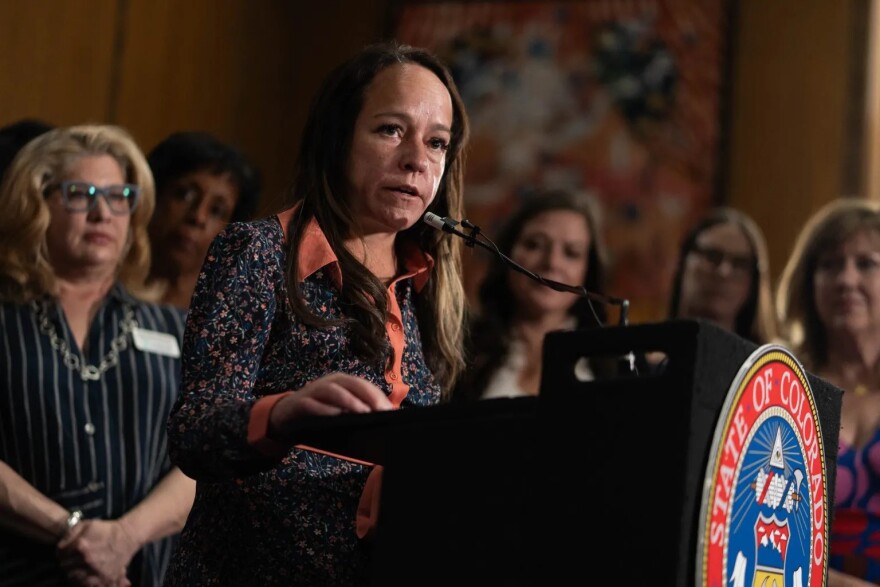This story was produced as part of the Colorado Capitol News Alliance. It first appeared at coloradosun.com.
Democratic leaders at the Colorado Capitol have been describing the revenue-raising measures they passed to plug a roughly $750 million gap in the state budget caused by Republican federal tax and spending bill as closing corporate tax loopholes.
But at least one of the four major changes the Democratic majority in the General Assembly made to the state’s tax code during the recent special legislative session will predominantly affect small businesses.
That was House Bill 1005, which eliminates the state’s sales tax vendor fee starting next year.
The fee (it’s really a rebate) lets businesses with up to $1 million in taxable sales per filing period (generally monthly), or up to $10 million in annual revenue, keep up to 4% of their state sales tax collections each month, up to $1,000. That’s a maximum annual benefit of $12,000 a year.
The rebate, enacted some 90 years ago, was intended to compensate businesses for the strain of calculating and collecting sales taxes. But Democrats argued it’s unnecessary now since that work is mostly automated.
Regardless of the arguments for and against the rebate, one thing is clear: It’s something that affects small businesses more than large corporations.
State Sen. Mike Weissman, D-Aurora, argued to reporters Wednesday that since the rebate can be claimed by businesses earning up to $10 million in revenue annually, it’s more than just a small business benefit.
“I think that’s a little bit more than the mom-and-pop shop on the corner,” he said.
But those high-dollar businesses aren’t the ones benefitting most from the rebate, according to the sponsors of the measure.
State Sen. Cathy Kipp, a Fort Collins Democrat and a lead sponsor of House Bill 1005, told the Senate Appropriations Committee that the lawmakers behind the measure considered limiting the businesses eligible for the rebate to those earning $500,000 per filing period instead of doing away with the rebate altogether.
Kipp said they didn’t do that because it would have only increased state revenue by $5 million annually, as opposed to $57 million if they did away with the rebate.
Meanwhile, state Sen. Faith Winter, D-Broomfield, described it as a small business benefit in committee and on the Senate floor, pointing out that it saves small businesses an average of $80 a month.

“Is it worth losing your child’s teacher for $80 a month?” she said in committee of the trade-off of doing away with the tax break to help close the $750 million hole in the state budget caused by congressional Republicans’ tax and spending bill, called the One Big Beautiful Bill Act but also known as H.R. 1.
Keep in mind that the rebate only applies to the state’s 2.9% sales tax.
Weissman also argued that eliminating the sales tax vendor fee saved the least amount of money of all the tax changes Democrats made during the special session, which is true. The other tax breaks cinched or ended by Democrats raised about twice as much money — each.
And Kipp pointed out that the businesses losing the benefit are getting lots of help through the Republican federal tax and spending bill.
“I value our small business community. I value our restaurants and retailers,” she said. “And they are getting huge, substantial tax benefits from H.R. 1, which makes this the perfect time to put this into effect.”
Republicans, however, said it was wrong to increase any costs for businesses since that would trickle down to employees and customers.
“I just don’t understand how we can sit here and not realize that the health of our core of our communities — which is the draw that we want in our communities — we’re putting at risk,” said state Rep. Rick Taggart, a Grand Junction Republican.
Nick Hoover, government affairs director for the Colorado Restaurant Association, told the legislature that restaurants across Colorado are already struggling financially. He said taking away the rebate “is just going to be another cost for these restaurants — and it’s already death by 1,000 cuts.”
Ian Brogden does the accounting for his daughter Claire’s cafe, Windsor Lake Coffee, which serves breakfast, lunch and ice cream using mostly Colorado ingredients.
Brogden, 63, said while it’s true that the process for collecting sales tax is now largely automated, he still has to pay for that automation service in the form of credit card fees. And he has to run the report on sales, calculate the tax owed, enter this all into the state revenue system and submit the payment each month, he said.
He was surprised to hear lawmakers’ justifying removing the vendor fee, which covers the cafe’s cost to collect sales tax, because of the automation.
“It made it seem like people who are talking about it had never run a small business,” he said.
Brogden estimates he collects about $1,500 in sales tax for the state each month at the cafe in Windsor and pays about $45 for credit card processing. He said he gets about $58 from the sales tax vendor fee, netting about $13 for collecting the tax revenue each month.

“Fifty dollars a month isn’t a big deal, but it’s $50 out of my daughter’s bank account,” he said. “Every extra dollar that gets spent is money that’s not going into her pocket.”
Still, losing the vendor fee likely won’t materially impact the business, he said, which plans to expand to include retail space for a few local artists.
House Bill 1005 was the tax measure passed during the special session, which ended last week after six days, that most divided Democrats at the Capitol.
The bill passed 18-17 in the Senate. The Democratic senators who voted “no” on the legislation were Lindsey Daugherty, Tony Exum, Janice Marchman, Kyle Mullica and Dylan Roberts.
In the House, the bill passed 37-25, meaning a handful of Democrats defected in the lower chamber, too.
GOP lawmakers all voted against the bill.
Republican Rep. Anthony Hartsook of Parker actually brought an amendment that would have limited the businesses eligible for the rebate to those earning $500,000 per filing period. It failed 35-25 in the House.
For historical context: The rebate has ebbed and flowed since it was first adopted in 1935. It was nixed for one year in 2009 in the wake of the Great Recession.
It was set at 4% starting in 2020 to help businesses through the pandemic. It hadn’t been that high since 1965, when it was 5%.





